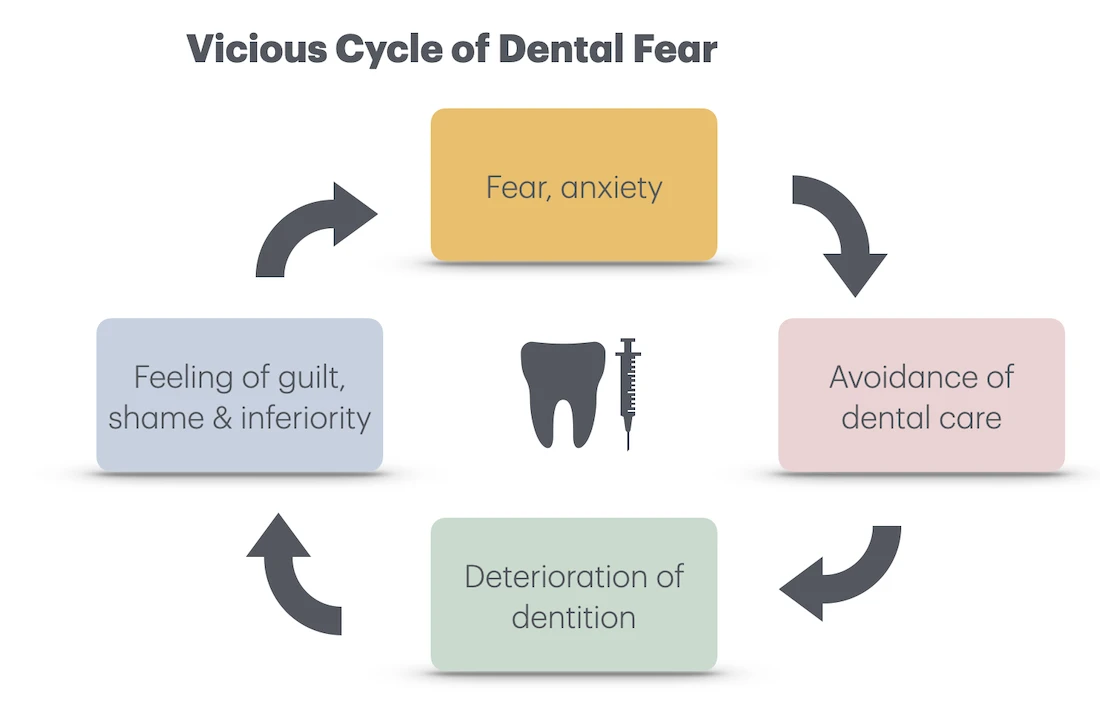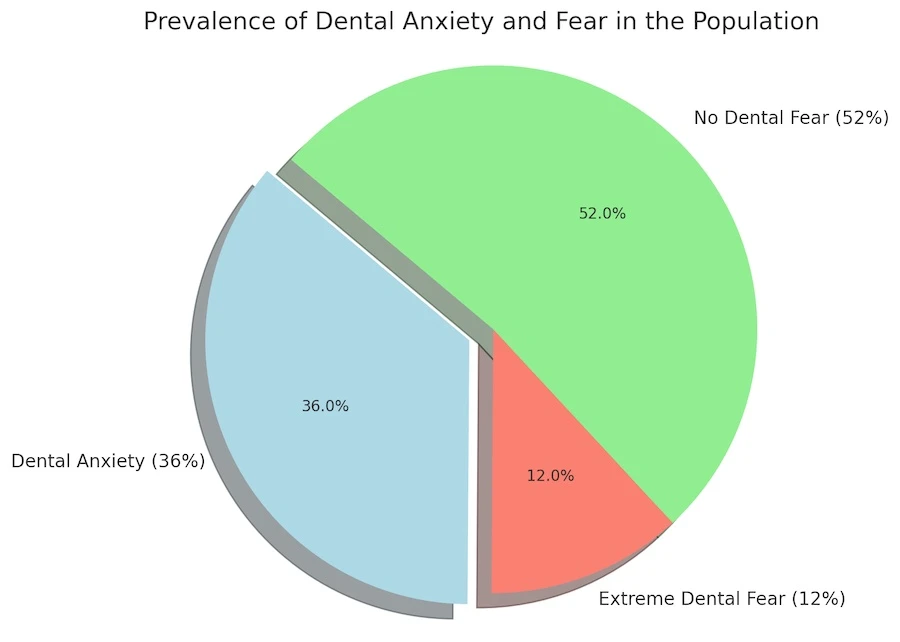Dental phobia is a significant barrier to maintaining good oral health, affecting millions of people worldwide. In fact, 12% of the world’s population—approximately 960 million people—experience an intense fear of visiting the dentist.
This anxiety-driven fear can prevent individuals from seeking essential dental care, leading to worsening oral conditions and a diminished quality of life.
Understanding the various types of fear associated with visiting the dentist is crucial for both patients looking to treat dental phobia and for dental professionals. Each type of fear—ranging from the fear of pain to the fear of cost—has its own set of triggers and impacts, influencing how individuals approach dental visits and treatments.

The Impact of Dental Phobia and the Fears That Drive It
This fear is also known as odontophobia, is a severe and persistent fear of dental procedures and environments. This condition goes beyond mere discomfort or anxiety; it can evoke intense feelings of dread, panic, and avoidance in individuals, leading to significant consequences for their oral health.
People suffering from dental phobia often delay or entirely avoid dental visits, even when experiencing severe pain or symptoms of dental disease. As a result, they are at a higher risk for developing chronic oral health issues such as tooth decay, gum disease, and infections, which can further exacerbate their fears and negatively impact their quality of life.

Dental phobia is not a monolithic condition but rather a complex interplay of various specific fears that collectively contribute to a person’s overall anxiety about dental care. There are several treatments available for dental phobia, ranging from behavioural therapies and sedation options to alternative approaches like hypnotherapy, each tailored to address the unique needs of the patient.
Did you know? Around 36% of people experience dental anxiety, and 12% suffer from extreme dental fear? This anxiety can significantly impact not just dental attendance, but also overall quality of life, with many believing their oral health directly affects how they live day to day! [R]

What Are the Common Types of Dental Phobia?
Dental phobia stems from a variety of specific fears that can significantly hinder a person’s ability to seek and receive dental care. The fear of dental procedures can lead to significant avoidance behaviours. In a recent study, 38.5% of individuals with moderate to high dental fear demonstrated avoidance patterns that correlated with increased treatment needs, contrasting sharply with only 0.9% of those with no dental fear. [R]
1. Fear of Pain
The fear of pain is one of the most prevalent types of dental phobia, characterised by an intense worry about experiencing discomfort or pain during dental procedures. This fear is often triggered by specific aspects of dental treatment, such as needles, drills, or other invasive tools. For many, the mere anticipation of pain can be overwhelming, leading to a strong aversion to dental visits.

2. Fear of Loss of Control
The fear of loss of control is another significant aspect of dental phobia, where individuals experience intense nervousness about being in a vulnerable position during dental treatments. This fear often stems from situations where patients feel restrained, unable to speak, or unable to move freely while in the dentist’s chair.
For example, a patient might feel extremely anxious during a procedure where they need to keep their mouth open for an extended period, especially if they are unable to signal discomfort or request a break.
The sense of helplessness can be distressing, making it difficult for them to undergo certain procedures or even maintain regular dental care. This fear can lead to avoidance of dental visits, which may result in deteriorating oral health.
3. Fear of Cost
The fear of cost is a significant barrier for many individuals when it comes to seeking dental care. This concern stems from the anxiety about the financial implications of dental treatments, particularly when there is uncertainty about the extent of coverage provided by insurance or the potential for unexpected expenses. Patients often worry that necessary procedures will be prohibitively expensive, leading to a reluctance to pursue even routine dental visits. This fear can cause individuals to delay or avoid dental care altogether.

4. Fear of Embarrassment
The fear of embarrassment is a common yet often overlooked aspect of dental phobia. This fear revolves around the worry of being judged or feeling ashamed about one’s oral health. Patients may feel self-conscious about the state of their teeth, gums, or overall dental hygiene, particularly if they believe their dental appearance or past habits (such as smoking or neglecting dental care) will be scrutinised. This anxiety can be heightened by the fear that their dentist might react negatively, criticise them, or express disappointment. The anticipation of such judgement can be distressing, that it leads patients to avoid dental visits altogether.
5. Fear of Injections
Fear of injections is a specific and common concern among dental patients, particularly related to the administration of local anaesthesia. This fear can arise from the anticipation of pain associated with the needle, the sensation of the injection itself, or previous negative experiences. For many, the sight of the needle alone can trigger significant anxiety, making them dread the procedure even before it begins. This apprehension can lead to heightened stress during dental visits, causing some individuals to avoid necessary treatments altogether.

If you or someone you know struggles with this fear, needle phobia hypnosis can be an effective solution to help manage and overcome these anxieties, allowing for a more relaxed and stress-free dental experience.
6. Fear of Choking
The fear of choking is another specific anxiety that can significantly affect a person’s comfort during dental visits. This fear typically revolves around the worry of choking on dental tools, materials, or even fluids used during procedures. Patients may feel uneasy about the potential for small instruments or debris to become lodged in their throat, leading to feelings of panic or distress. This fear is particularly intense for those who have had previous experiences of gagging or difficulty swallowing during dental treatments. The anxiety can be so overwhelming that it causes some individuals to avoid necessary dental care.
To alleviate this fear, dentists can use techniques such as adjusting the patient’s position, using suction devices effectively, and providing reassurance throughout the procedure to ensure a safe and comfortable experience.
Causes of Dental Phobia
The following sections explore the primary sources of dental phobia, highlighting how direct experiences and learned behaviors contribute to this widespread issue.
Direct Traumatic Experiences
Individuals with dental phobia often link their anxiety to a specific, negative past experience in a dental setting, especially if it involved pain or discomfort. Childhood traumatic events in dental settings are particularly influential.
Vicarious Learning of Dental Anxiety
Studies show that those who reported child onset dental anxiety had a parent or sibling who also suffered anxiety about dental treatment. This suggests that, as children, they learned their anxious response to dental treatment by observing the behaviour of those around them.
Did you know? A study of 3,000 UK residents found that 73% of participants believed their oral health had an impact on their quality of life.
Prevention and Management Strategies
Effectively addressing dental phobia requires a collaborative approach between dental professionals and patients. For dental professionals, implementing strategies to minimise patient anxiety is crucial. This includes creating a calm and welcoming environment, using clear and empathetic communication, and offering options such as sedation or distraction techniques during procedures. Taking the time to understand each patient’s specific fears and tailoring the approach accordingly can make a significant difference in their comfort level.
For patients, self-help strategies play a vital role in managing dental fears. Techniques such as deep breathing exercises, mindfulness, and positive visualisation can help reduce anxiety before and during dental visits. Additionally, building a trusting relationship with a dentist who understands and respects their fears is essential in creating a positive and less stressful dental care experience.
Ultimately, overcoming dental phobia is about fostering a supportive and understanding environment. When dental professionals and patients work together, it becomes possible to break the cycle of fear, ensuring that everyone has access to the essential care they need for maintaining good oral health.
